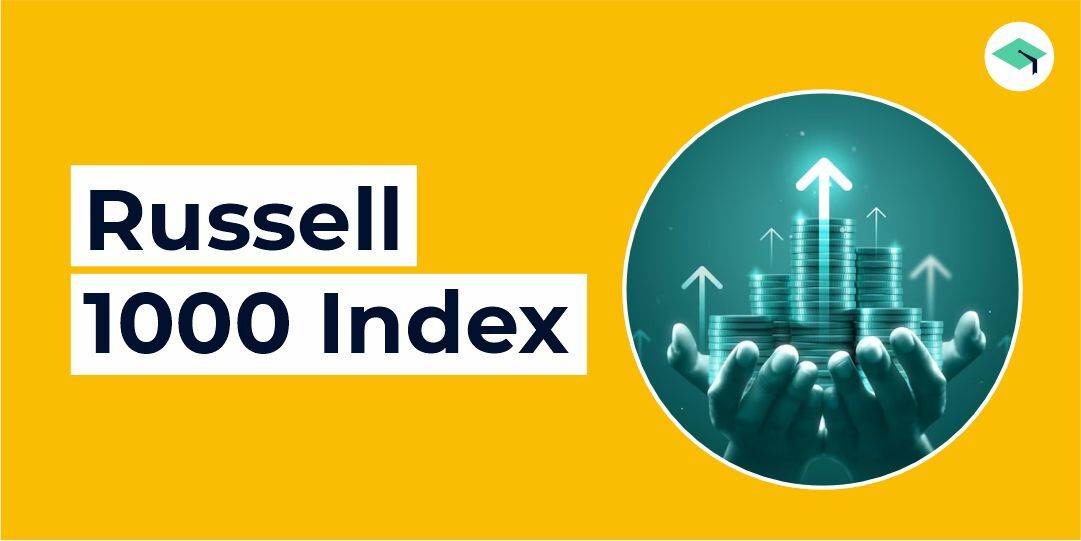You all know the S&P 500 and the Nasdaq 100 or the Dow Jones Industrial Average. There are many more indices that represent the US financial markets. One such index is the Russell 1000 index.
What is the Russell 1000 index?
The Russell 1000 is a stock market index that tracks the performance of the top 1,000 publicly traded businesses in the United States based on market capitalization or the cumulative value of all of their outstanding shares.
It accounts for 1/3rd of the Russell 3000, comprising the 3,000 largest publicly traded corporations in the United States by market capitalization.
The index is the equivalent of 98 percent of all publicly traded corporations in the United States.
Since the company’s market capitalization changes over time, the FTSE Russell Group re-examines the rankings of companies in its indices every May to assure accuracy.
New firms that go public, such as through initial public offerings (IPOs), are added to the index quarterly if their market cap exceeds a certain threshold. Hence the index might have more than 1000 companies.

Digging deeper
The Russell 1000’s holdings are determined by ranking all of the Russell 3000’s stocks by market capitalization and determining the market cap threshold of the 1,000th stock ranking.
The significant market capitalization utilized to establish index eligibility is this breakpoint. Many stocks get exchanged at the annual reconstitution between the Russell 1000 and Russell 2000, but the market capitalization barrier is the deciding factor.
The top 10 Russell 1000 companies by market capitalization are
| Company | Ticker |
| Apple | AAPL |
| Microsoft | MSFT |
| Amazon | AMZN |
| Tesla Inc. | TSLA |
| Alphabet Inc Cl A (Google) | GOOGL |
| Alphabet Inc Cl C (Google) | GOOG |
| Nvidia Corp | NVDA |
| Meta Platforms Inc | FB |
| Berkshire Hathaway Inc | BRK.B |
| JPMorgan Chase & Co. | JPM |
The list mentions Google twice because of the two categories of shares.
FTSE Russell publishes the Russell 1000 Index’s performance and attributes every month. The Russell 1000 had 1,013 holdings as of February 28, 2021, with an average market worth of $421.75 billion.
The median market capitalization was $13.5 billion, with Apple (AAPL) having the highest market capitalization at $2.07 trillion.
The FTSE Russell Group maintains specialist indices that track the performance of Russell 1000 subsets, such as:
- Russell 1000 Value
- Russell 1000 Value Dynamic
- Russell 1000 Value Defensive
- Russell 1000 Growth
- Russell 1000 Growth & Value
- Russell 1000 Growth Dynamic
- Russell 1000 Growth Defensive
- Russell 1000 Global Exposure
- Russell 1000 Pure Domestic Exposure
Other Indexes vs. Russell 1000 index
The Russell 1000 and the S&P 500 are indexes that measure the top large-cap stocks in the United States. On the other hand, the S&P 500 only accounts for around 80% of the US stock market.
Russell 1000 index, on the other hand, follows twice as many companies as the S&P 500, accounting for around 92 percent of the US share market, including many mid-cap corporations.
The Russell 1000 may be more volatile than the S&P 500 since mid-cap firms are more volatile than large-cap stocks.
Furthermore, because the S&P 500 rebalances quarterly rather than yearly like the Russell 1000, it provides a better picture of what the market is doing over the year.
How to invest in the Russell 1000 index?
Though it is feasible to invest in the Russell 1000 by acquiring each of the individual stocks, this would be time-consuming due to the index’s size.
An ETF (Exchange Traded fund) or an index fund of the Russell 1000 is better for most investors.
While FTSE Russell does not offer any ETFs or index funds directly, buyers can find Russell 1000 ETFs or index funds through several funds.
Through online brokerage, you can buy Russell 1000 ETFs or index funds. Some ETFs are
- Vanguard Russell 1000 ETF
- iShares Russell 1000
- SPDR Russell 1000 ETF
Is the Russell 1000 a good investment?
Various criteria influence whether or not the Russell 1000 index should be in your investment portfolio.
Most experts advise investing in a broad market stock fund, the Russell 1000. Moreover, the index provides you with more expansive coverage of the US economy.
FAQs
What happens when a stock goes into the Russell 1000 index?
Once a stock goes into indexes, it’s either subtracted or added based on some factors like trading volumes, share price, market cap, etc. With Russell 1000 being added to a company, the demand for its shares tends to increase resulting in increased volatility in the short term.
What does the Russell 1000 index measure?
A stock market index, the Russell 1000 measures the performances of the 1,000 largest public companies in the U.S. by market capitalization.
Why is the Russell 1000 Index important?
The Russell Index serves as the leading benchmark for investors, be it mega-cap or microcap. It allows investors to track historical, as well as current market performance through investment style or specific market segments.
Is the Russell 1000 Index good?
Russell 1000 Index is a good investment option for investors who are looking for large-cap portfolio exposure. It allows you to invest in the 1000 largest public companies in the US economy.
